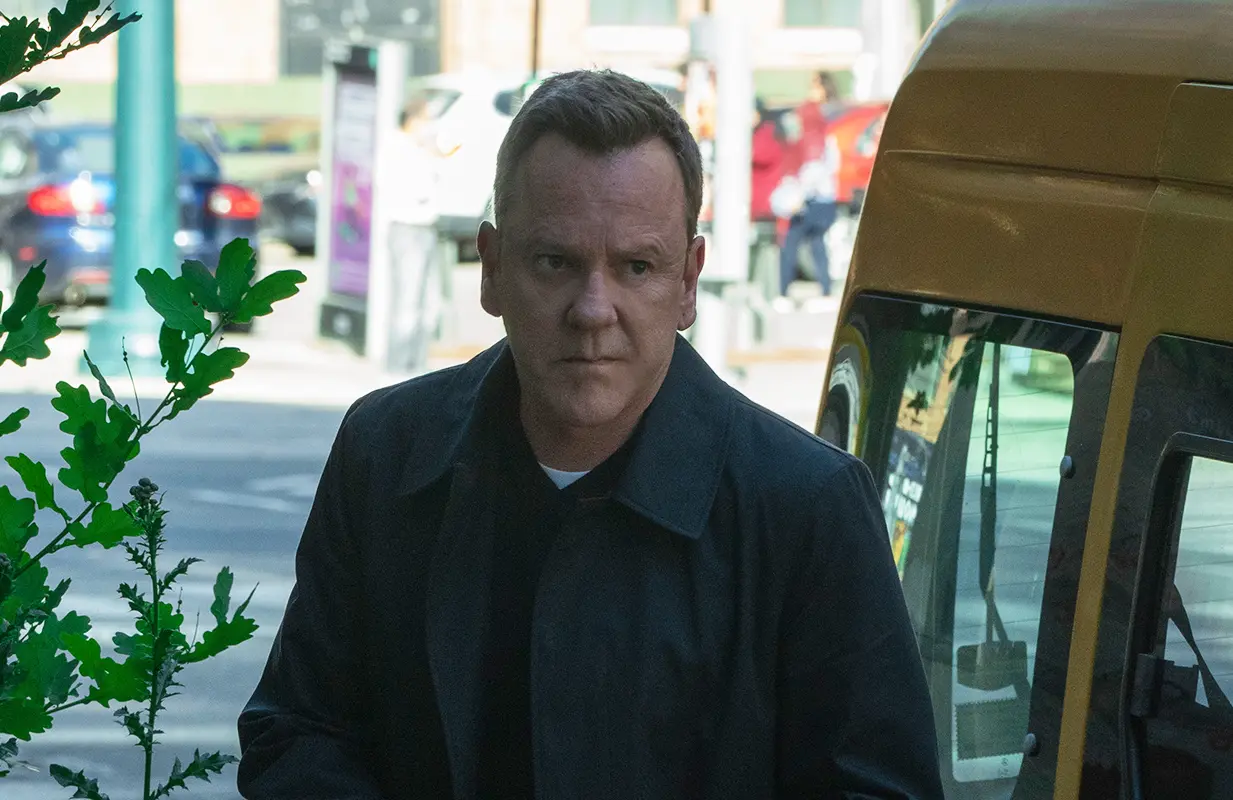Kiefer Sutherland Oozes Charisma in Flirty New Thriller Rabbit Hole
-
 Kiefer Sutherland in Rabbit Hole (Photo: Michael Gibson/Paramount Plus)
Kiefer Sutherland in Rabbit Hole (Photo: Michael Gibson/Paramount Plus)Kiefer Sutherland has understandably been giving interviews about how his new show Rabbit Hole is nothing like 24. Viewers might roll their eyes at the idea of him starring in yet another political thriller, particularly since Designated Survivor also happened, so it behooves him to stress that this Paramount+ drama has “a romantic side and a humorous side, all while moving at a thousand miles an hour.” But while it’s true that this distinguishes Rabbit Hole from the mirthless saga of Jack Bauer, it doesn’t quite make the series unique. Instead, the laughs-and-espionage approach slots the show comfortably into another familiar niche.
Consider this summary: A man who has mastered the art of espionage realizes a shadowy organization has marked him for death. To survive, he’ll need all his covert skills and some help from a flinty, funny woman he unexpectedly meets along the way. She’s not from his world, so they bicker at first, but they eventually have a fling. That relationship matters even more once he’s betrayed by a confidante inside the organization that helped train him.
This describes Rabbit Hole, but it’s also a solid explanation of AMC’s The Old Man, Prime Video’s Reacher, Netflix’s The Night Agent, and basically the entire Bourne franchise. This is simply the story that many thrillers tell: Heroes who think they’ve either mastered or escaped a system get devoured by it instead, then look for help from an unexpected source.
But templates aren’t necessarily bad. Formulaic entertainment can be quite pleasing, especially if it’s executed with panache, and this is where Rabbit Hole succeeds. Sutherland himself is key to the appeal. He practically vibrates with charisma as John Weir, a con man who’s made a fortune running scams that help businesses fleece each other. (He says he enjoys helping one rich jerk steal from another rich jerk, though his language is saltier.) The script may insist the character is paranoid and damaged, but Sutherland leans on the impish joy he takes in scheming. Even when he has to go on the run, because of the aforementioned betrayal by a confidante on behalf of a shadowy conspiracy, he projects playful intelligence. John Weir thrives when he’s outsmarting something.
True to Sutherland’s word, the series, which is executive produced by This Is Us executive producers Glenn Ficarra and John Requa, does indeed inject romance and comedy into this adventure. Weir quickly crosses paths with Hailey Winton (Meta Golding), a nonprofit lawyer whom he thinks is part of the plot to destroy him. He takes her hostage until he can figure out the truth, but she’s no pushover. In the four episodes screened for critics, their scenes fizz with rom-com energy as Hailey frustrates John with her tough questions, clever insults, and general refusal to do what she’s told. By the time she starts helping him spy on people (because of course she does), they have the makings of a Thin Man-style caper duo.
Ficarra and Requa can’t get enough of these reversals. Hailey is a hostage one minute, then she’s a spy. Other characters are dead, then they’re alive. What seems to be true is very often a lie — a point the show emphasizes every time it mentions how the internet distorts our perception of reality. To that end, John makes a big show of paying for everything with cash, only using burner phones, and never staying online for more than 15 minutes at a time. He does this not only to protect his identity, but also because he loathes online culture. One of his allies even lists four steps for how a democracy can be toppled via social media: discredit the mainstream media; divide people into ideological factions; discredit experts; and then install a puppet leader.
That’s what the shadowy conspiracy is attempting to do, but this speech is about more than the plot. It’s also Rabbit Hole’s blunt thesis statement, with obvious parallels to the pervasive anxiety that steps one through three are already complete. However, the show can’t integrate geopolitical philosophy nearly as well as sexy banter. These ideas tend to stop the action, so that people can speechify without the distraction of a fist fight or shoot-out. And in the first four episodes, at least, none of the characters who righteously condemn the internet acknowledge that they’re part of a similar culture. John Weir may hate computers, but his entire career has been built on manipulating the truth. One could argue he’s just mad that somebody else figured out a new way to do his dirty work.
But even with those wobbly ideas, the series is still an enjoyable lark. It may not be a groundbreaking thriller, but it’s well made and interesting enough to keep its template alive.
Rabbit Hole premieres March 26 on Paramount+. Join the discussion about the show in our forums.
Mark Blankenship has been writing about arts and culture for twenty years, with bylines in The New York Times, Variety, Vulture, Fortune, and many others. You can hear him on the pop music podcast Mark and Sarah Talk About Songs.
TOPICS: Rabbit Hole, Glenn Ficarra, John Requa, Kiefer Sutherland, Meta Golding